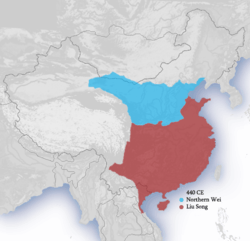440
| Millennium: | 1st millennium |
|---|---|
| Centuries: | 4th century · 5th century · 6th century |
| Decades: | 410s · 420s · 430s · 440s · 450s · 460s · 470s |
| Years: | 437 · 438 · 439 · 440 · 441 · 442 · 443 |
| 440 by topic | |
| Politics | |
| State leaders – Sovereign states | |
| Birth and death categories | |
| Births – Deaths | |
| Establishment and disestablishment categories | |
| Establishments – Disestablishments | |
| Gregorian calendar | 440 CDXL |
| Ab urbe condita | 1193 |
| Assyrian calendar | 5190 |
| Bengali calendar | −153 |
| Berber calendar | 1390 |
| Buddhist calendar | 984 |
| Burmese calendar | −198 |
| Byzantine calendar | 5948–5949 |
| Chinese calendar | 己卯年 (Earth Rabbit) 3136 or 3076 — to — 庚辰年 (Metal Dragon) 3137 or 3077 |
| Coptic calendar | 156–157 |
| Discordian calendar | 1606 |
| Ethiopian calendar | 432–433 |
| Hebrew calendar | 4200–4201 |
| Hindu calendars | |
| - Vikram Samvat | 496–497 |
| - Shaka Samvat | 361–362 |
| - Kali Yuga | 3540–3541 |
| Holocene calendar | 10440 |
| Iranian calendar | 182 BP – 181 BP |
| Islamic calendar | 188 BH – 187 BH |
| Javanese calendar | 324–325 |
| Julian calendar | 440 CDXL |
| Korean calendar | 2773 |
| Minguo calendar | 1472 before ROC 民前1472年 |
| Nanakshahi calendar | −1028 |
| Seleucid era | 751/752 AG |
| Thai solar calendar | 982–983 |
| Wikimedia Commons has media related to 440. |

Territories of the Northern Wei (blue) and Liu Song (Red) states (440)
Year 440 (CDXL) was a leap year starting on Monday (link will display the full calendar) of the Julian calendar. At the time, it was known as the Year of the Consulship of Valentinianus and Anatolius (or, less frequently, year 1193 Ab urbe condita). The denomination 440 for this year has been used since the early medieval period, when the Anno Domini calendar era became the prevalent method in Europe for naming years.
Events
By place
Roman Empire
- Flavius Aetius, Roman general (magister militum), returns as triumphator back to Rome after several years' fighting the Burgundians and Visigoths in Gaul. He is honoured by a statue erected by the Senate and by order of emperor Valentinian III.
Europe
- The Huns under Attila reappear in force along the frontier of the Western Roman Empire. They attack merchants on the north bank of the Danube and cities in Illyricum, including (according to Priscus) Viminacium, city of Moesia.
Africa
- A Vandal fleet and their allies (Alans, Goths and Moors) set out from Carthage for Sicily, the principal supplier of oil and grain to Italy after the loss of North Africa. They loot all the coastal towns and besiege Palermo. Heavily laden ships return to the court of king Genseric.
China
- Dynasties of the North and South: The Chinese Empire is unified by the Northern Wei Dynasty. The Northern state will have three competing dynasties—Northern Wei, Northern Qi and Northern Liang, while the Southern state is dominated by the Song (or Liu Song) Dynasty.
Asia
- The Hepthalites (White Huns) move south from the Altai Mountains region into Transoxiana, Bactria, Khorasan and eastern Persia.
- A center of Buddhist studies is established at Nalanda in Bihar on the plains of the Ganges River (India).
By topic
Art
- The Parting of Lot and Abraham, mosaic in the nave arcade, Church of Santa Maria Maggiore (Rome), is made.
Ancient Games
- Chaturanga, Indian war game, and an ancestor of chess through the Persian game of Shatranj (or Chatrang), evolves in the Indus Valley on the Indian subcontinent (approximate date).
Religion
- August 18 – Pope Sixtus III dies after an 8-year reign in which he has resisted heresy and sponsored major construction programs in Rome. He is succeeded by Leo I as the 45th pope.
- September 29 – Leo I begins to formulate orthodoxy and condemns Eutychianism, an extreme form of monophysitism which holds that the human nature of Christ is absorbed by his divine nature.
- Winter – Leo I sends a letter to Valentinian III, stating "by the Holy Spirit's inspiration the emperor needs no human instruction and is incapable of doctrinal error".
Births
- Bodhidharma, semi-legendary Buddhist monk (approximate date)
- Childeric I, king of the Salian Franks (approximate date)
- Euric, Visigothic king and son of Theodoric I (d. 484)
- Gaudentius, son of Flavius Aetius (approximate date)
- Qi Wudi, Chinese emperor of the Southern Qi Dynasty (d. 493)
- Tonantius Ferreolus, Gallo-Roman senator and prefect of Gaul
- Vakhtang I, king of Iberia (modern Georgia) (approximate date)
- Wen Cheng Di, emperor of the Northern Wei Dynasty (d. 465)
Deaths
- February 17 – Mesrob, Armenian monk and linguist (b. 362)
- August 18 – Pope Sixtus III
- Amalgaid mac Fiachrae, king of Connacht (Ireland)
- Yuan Qigui, empress and wife of Wen of Liu Song (b. 405)
References
This article is issued from Wikipedia - version of the 4/5/2016. The text is available under the Creative Commons Attribution/Share Alike but additional terms may apply for the media files.